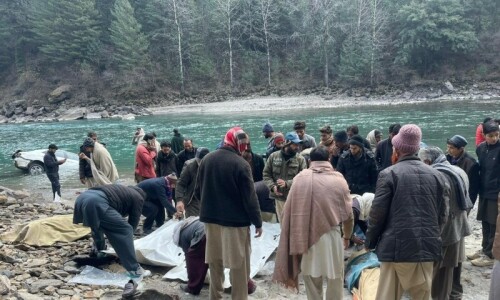Tajamal Hussain, a resident of Thoha Bahadur village in Chakwal, had been working in agriculture since his boyhood.
Now, 52, the farmer did not see his economic condition improve until he took the difficult decision five years ago to turn to olive farming – then an alien practice in the area.
“I planted olive saplings on one acre. This year I have managed to earn Rs150,000 by selling 60kg olive oil which has been produced from the one acre of land. In my small olive orchards, I also cultivate vegetables, melons and watermelons as there is enough space among the olive plants. Thus I can earn Rs600,000 from one acre in a year,” says the excited Tajamal. He adds that there is no crop better than olive.

Like Tajamal, there are scores of other farmers in the Potohar region who have switched to olive farming as the Punjab government has resolved to turn Potohar into an olive valley and is fully facilitating the growers.
Spain, having an area of 2.4m hectares, is the largest olive producer in the world which produces 1,199,200 tons of olive oil annually. Pakistan, which spends Rs245 billions on the import of edible oil every year, has 3.17m hectares of potential area for olive farming.
Authorities in Pakistan moved into action in 2012 when the Punjab government decided to turn the Potohar region into an olive valley due to its great potential for the crop.

The Barani Agriculture Research Institute (Bari) in Chakwal was made the centre of this massive campaign which has so far generated a number of success stories.
“Every year, the provincial government distributes 300,000 saplings of olive among the farmers of the region free of cost. So far olives have been planted on 5,500 acres of land in the region as around 1,000 farmers have planted olives,” said Dr Mohammad Tariq, the director general of Bari. To facilitate the farmers, a state-of-the-art olive mill with the support of Italy has been installed at Bari where the growers can get their oil extracted free of cost. During the ongoing season, 12 tons of olive oil has been produced at Bari and according to officials 20 tons of oil extraction is expected this year.

“Olive farming would not only bring a change in the lives of farmers but would also reduce the country’s hefty budget which is spent on the import of olive oil annually. Moreover, olive farming would also help Pakistan fight against climate change as olive is highly environment friendly,” Dr Tariq added.
“Planting olive is the best nature-based solution to reduce the risks of climate change,” he said.
The Punjab government which has set up an Olive Development Board is also going to establish certified olive nurseries to enhance the olive farming in the region.

“Olive is the best crop from every aspect. It needs less water and is also less laborious. In the near future it would emerge as the major cash crop in the Potohar region,” Dr Tariq said.
Published in Dawn, November 5th, 2017













































Dear visitor, the comments section is undergoing an overhaul and will return soon.